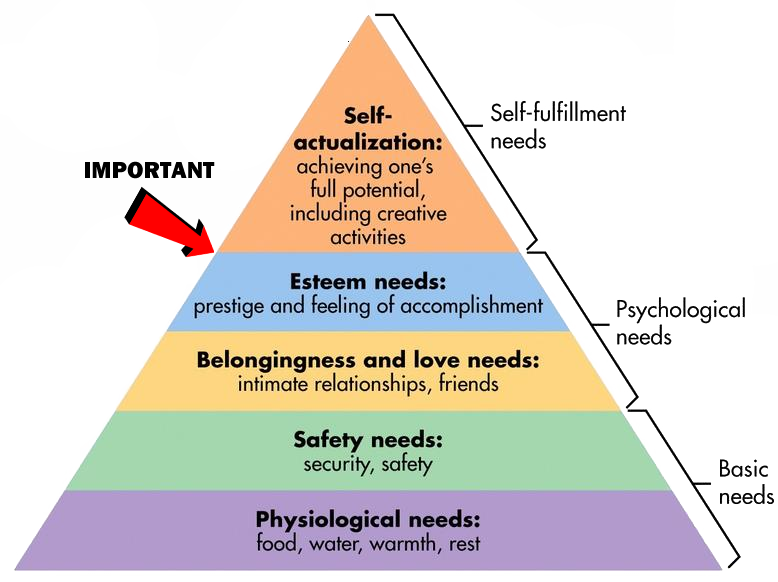 The desire to feel important is the most subtle desire entertainment can address—it’s the one most taken for granted and overlooked. But its absence is the single greatest source of misery in modern man. Feeling stupid or undesirable is terrible, but feeling unimportant strikes an even deeper chord. It ties in with our very will to live!
The desire to feel important is the most subtle desire entertainment can address—it’s the one most taken for granted and overlooked. But its absence is the single greatest source of misery in modern man. Feeling stupid or undesirable is terrible, but feeling unimportant strikes an even deeper chord. It ties in with our very will to live!
Below, I’ll delve into what it means to feel important and why we crave it desperately without even knowing it. I’ll explain how you can satisfy this vicariously with the protagonist from Samurai of Hyuga as an example. I’ll enlist Dale Carnegie’s help to explain the power the importance-giver has over his/her audience.
And finally, I’ll give a rare bit of realtalk from me to every young geek out there.
As High As It Goes
In contrast to feeling desired, the feeling of being important is the highest desire a form of pure entertainment can replicate. Anything above requires the audience to go beyond consuming and into creation. While some games like Minecraft and RPG Maker can reach this level, they are (at that point) mediums for creation instead of simply games. If you have ever roleplayed on an internet forum or played Dungeons & Dragons with others, then you know it scratches an itch nothing else can!
The Source
Imagine a villain had a gun pressed against your forehead, with only a single question for you to answer: “What are you?” Assuming you weren’t trying to be cute, and that you didn’t say something like ‘scared shitless’, your reply would reveal the source of your importance. Whether it be ‘student’ or ‘actress’ or ‘Vietnam veteran’, or even ‘interactive fiction writer’, THIS is who you are.
There’s a good case to make that feeling important isn’t any different than feeling alive!
What Makes Us Feel Important
MC, the main character from Samurai of Hyuga, is important right from the opening scene: he/she has become the reluctant and careless bodyguard for a rich brat known as Masami/Masashi Hashimoto. This responsibility doesn’t just drive the plot forward—it provides MC with a newfound sense of self-worth. The responsibility only escalates when the Emperor himself tasks MC with a divine quest that will send the group all across Hyuga.
‘The Sword Who Cuts the Heavens’ isn’t so different a title as ‘executive manager’, ‘mid-level developer’ and ‘mom’. Responsibilities are so tied to our feeling of importance, that we risk existential crisis and depression without any. The angsty emo and goth kids before them didn’t just suffer from poor fashion sense: they suffered because they weren’t relied on nor held accountable for anything.
Dale Carnegie’s Law
There is one all-important law of human conduct. If we obey that law, we shall almost never get into trouble. In fact, that law, if obeyed, will bring us countless friends and constant happiness. But the very instant we break the law, we shall get into endless trouble. The law is this: Always make the other person feel important. John Dewey, as we have already noted, said that the desire to be important is the deepest urge in human nature; and William James said: “The deepest principle in human nature is the craving to be appreciated.” As I have already pointed out, it is this urge that differentiates us from the animals. It is this urge that has been responsible for civilization itself.
You want the approval of those with whom you come in contact. You want recognition of your true worth. You want a feeling that you are important in your little world. You don’t want to listen to cheap, insincere flattery, but you do crave sincere appreciation. You want your friends and associates to be, as Charles Schwab put it, “hearty in their approbation and lavish in their praise.” All of us want that.
—Dale Carnegie, How to Win Friends and Influence People
Real Esteem Isn’t In What We Consume
The definition of being a geek, in my opinion, is to love and deeply appreciate a form of entertainment. Be it League of Legends or Game of Thrones, geeks embrace what they consume. This isn’t bad, in fact I think it’s the opposite: it is what adds color and flavor to our lives. Just imagine how bland life would be if we could only fall in love with other people!
My bit of advice is directed towards a younger me. I used to take pride in having ‘good taste’, for being an insightful critic who could write you an essay on how season 2 destroyed season 1, or how the original manga was superior, or how the Tsukihime anime ought not to even exist. I was bitter back then because I tried to establish my importance on what I consumed, instead of creating things and taking on real responsibilities.
You don’t have to take it from me. Here is a lecture by a clinical psychologist that I needed to hear years ago:


I love each one of your posts. They’re always so interesting to read!
Are you having more trouble with book 3 than with the others? Or is it easier? Which book is you favorite, at least until now (1, 2 and 3)?
I hope you’re having fun writing SoH 3! I can’t wait to read it! ^^
I’m glad you enjoy them!
Book 3 isn’t giving me more trouble, but it is the most challenging of the bunch so far. This was by design, because not only does a lot happen in the narrative, it introduces a new gameplay mechanic that requires a lot of scripting behind the scenes. It has all been very worthwhile, and to be completely honest I think this book will be the best I’ve ever made.
Until Book 4, anyway!
sounds like its going to be good. i can’t wait!
The hype is real!! So many awesome stuff are gonna go down in the coming year!!!
Appreciate the knowledge!
Can’t wait for book 3!!